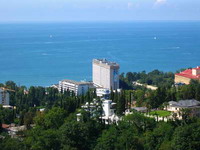Sochi to house 2014 Winter Olympics
A single road snakes past shabby houses and dismal small farms, marking the way from Sochi's seashore into the mountains. The same route soon will be transformed, with a gleaming high-tech train line and smooth, swift new roads to carry travelers to the 2014 Winter Olympics.

Seven years is a short timetable for such an ambitious project, but the International Olympic Committee believes Russia can do it, as well as build the gleaming ice arenas, giant sporting venues and everything else needed for the games.
Vladimir Putin, too, is confident. After all, the Russian president's determined pitch for Sochi included a pledge: "No traffic jams, I promise."
For many Russians, the IOC vote awarding Sochi the games was proof of the country's resurgence. It also was a major victory for Putin, who threw his full weight behind the campaign, at a time of growing criticism of his government's democracy and human-rights record.
Putin, who frequently skis in Sochi, said being awarded the Olympics was a recognition of Russia's sports tradition and its growing economic and cultural clout in the world.
"This is support from one of the most authoritative and independent international organizations - the International Olympic Committee," he said in televised comments upon returning from Guatemala City, where the decision was announced.
Footage broadcast over and over showed exuberant Russian officials and athletes dancing and singing and celebrating in Guatemala and Sochi. Moscow hosted the 1980 Olympics, but Russia has never held the Winter Games.
But everyone is convinced that the Sochi games will be an unquestionable boon.
The project still must address protests by environmental watchdogs and local residents who say it will destroy the region's fragile ecosystem. And building nearly every Olympic venue new in a relatively short time period won't be easy.
In the Imereti lowland, a picturesque valley where half of the Olympic facilities will be, five billboards advertising future arenas stand amid green meadows and corn fields. Yet a lone yellow-and-red excavator slowly plowed the ground - a sign that plenty of work lies ahead.
Officials portray the lack of facilities as an asset, saying it will mean the most up-to-date games ever.
"Imagine how great the Sochi games will be!" said Lyudmila Ignatenko, a 60-year-old resident of the lowland, who celebrated Sochi's victory with a festive family dinner.
Some of her neighbors are far less enthusiastic.
Anton Kovalenko, a 23-year-old security guard, said his single-story concrete house near the beach likely will be torn down to make room for stadiums and hotels, while his family will be offered smaller quarters in a worse location.
"If the government decides to do something, there is nothing ordinary people can do about it," Kovalenko said.
Environmentalists say up to 1,000 houses in the Imereti lowland, as well as near the Krasnaya Polyana ski area, could be demolished.
Sochi deputy mayor Irina Badayan defended the relocation plans, saying the houses involved are old and should be torn down anyway.
Putin's government has pledged $12 billion (8.8 billion EUR) to turn Sochi from a worn-out resort of traffic jams, ramshackle Soviet-era hotels and aging villas into a world-class winter sports complex.
In Russia - where the line between private and public money is often blurred - some of the country's largest corporations have been pouring money into the area.
Chris Weafer, chief strategist for Alfa Bank in Moscow, said in a note to investors that winning the games will boost the Russian economy by at least $15 billion (11 billion EUR), but it might be an even bigger boost for Putin.
Constitutionally barred from running for a third consecutive term in March, Putin has hinted he will retain influence after he steps down and has not ruled out returning to the presidency in 2012.
"President Putin has personally led the campaign to bring the games to Russia, and that should help sustain both his popularity and public profile," Weafer said. "It may also, possibly, help keep his options open for another run in 2012."
Subscribe to Pravda.Ru Telegram channel, Facebook, RSS!





